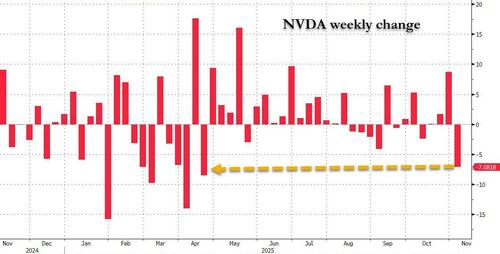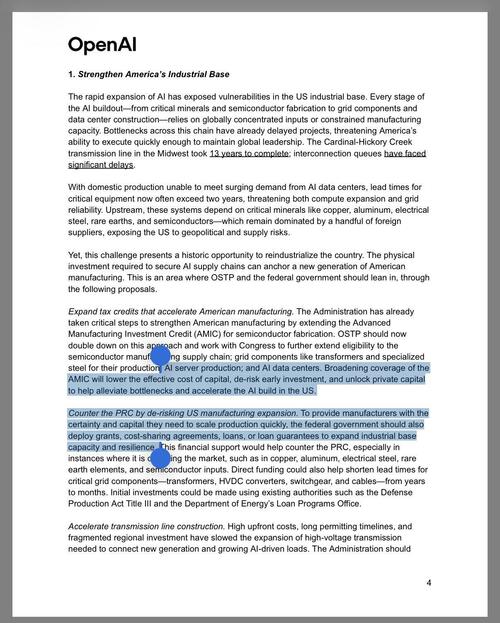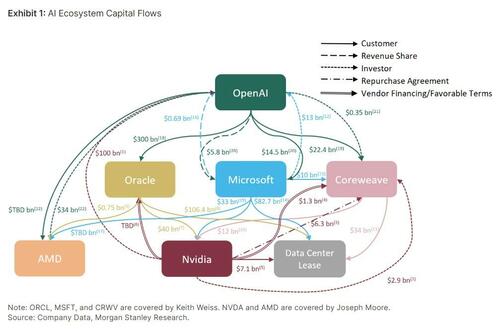About one month ago, when the Mag 7 stocks were screaming higher every day without a care in the world, and before the masses had even considered who would fund the trillions in future capex needs once the organic cash flow topped out - something we had just discussed in "AI Is Now A Debt Bubble Too, Quietly Surpassing All Banks To Become The Largest Sector In The Market" in which we explained why attention would very soon turn to AI companies issuing gargantuan amounts of debt (something we first discussed in July, long before anyone was considering this issue) as has now become the case - we decided to move even further beyond the curve and said that not even the debt would be the gating factor for the AI revolution-cum-arms race, but rather access to energy. That's because at some point - somewhere around the time companies realized they would no longer be able to rely on either equity or debt capital markets - the US government itself, if it wanted to win the AI war with China where the state directly subsidizes local data centers and AI figures, would have to step in and provide the required capital.
Specifically, we said that "The money is not the problem: AI is the new global arms race, and capex will eventually be funded by governments (US and China). If you want to know why gold/silver/bitcoin is soaring, it's the "debasement" to fund the AI arms race."
Even Elon Musk decided to respond to that particular observation.
And since it had become the norm, we thought it would take the market the usual 6-9 months to catch up to what we - and our readers - were already considering, especially since there still was ample "dry powder" capital among the hyperscalers to delay the rather unpleasant conversation of who would fund what once the money was gone, or so we thought.
Because this time it took less than a month.
What happened, as the market learned the hard way this week, is that OpenAI's CFO Sarah Friar, with all the finesse of a bull in a China data center, slammed the growing market skepticism that AI would cure cancer, slice bread and lead to universal utopia, and said “I don’t think there’s enough exuberance about AI, when I think about the actual practical implications and what it can do for individuals."
Her comments came in response to a podcast in which her boss Sam Altman participated, and where he was grotesquely - in a Jeff Skilling sort of way - defensive when billionaire Brad Gerstner asked how a company with $13BN in revenue can afford $1.4T in commitments. Altman’s reply? “If you want to sell your shares, I’ll find you a buyer."
Gerstner did not want to sell his shares - at least not yet - but the fact that Altman did not have a clear answer (that would have to come several days later in an Bill Ackman-size tweet), and instead responded by attacking what would be considered a very rational question, while refusing or being unable to give a clear answer.
However, what Friar did say - and what promptly spooked the market on Wednesday - is a mangled explanation of where the $1+ trillion in required funding would come from, saying OpenAI is “looking for an ecosystem of banks [and] private equity” to support its ambitious plans. But what triggered the selling is when she explicitly said that the US government would have to “backstop the guarantee that allows the financing to happen."
In other words, when all the other sources of funds dried up - clearly a scenario the company is considering judging by her response - the company would have to come to the US taxpayer.
She further explained that "Federal loan guarantees would really drop the cost of the financing," enabling OpenAI and its investors to borrow more money at lower rates to meet the company's ambitious targets. Right... because there is nothing like a company with $14BN in revenue, $1 trillion in "valuation" and $1.4 trillion in commitments, than loading up to the gills with government-backstopped debt. See, if only Enron and Lehman could do the same, both would still be around...
Her comments from Wednesday afternoon immediately spooked the market and NVDA shares suffered their biggest weekly drop since April.
And the reason for the drop is precisely the fact that OpenAI was clearly considering what it would do when the money to fund the trillions in spending - first cash from operations, then debt, then equity - and circular deals dried up, the capital that had lifted NVDA to a $5 trillion market cap and OpenAI reportedly worth around $1 trillion ahead of its looming IPO (which will come just as the AI bubble truly peaks).
The fact that US taxpayers were basically the source of that money, is a little truth the market wasn't read to hear just yet.... a truth which we laid out clearly one month ago.
The reaction - both in the market and within the heretofore complacent narrative surrounding the AI bubble - set off fire alarms, and prompted Sam Altman to publish his longest yet post (clocking in at almost 1100 words), in which he meant to "clarify a few thing", namely that Friar had "misspoken" and that the ChatGPT maker was not seeking a bailout for its infrastructure commitments, and contrary to what his CFO mentioned, he "does not have or want government guarantees."
Only, he does... but don't call it a guarantee, or bailout.
You see, Friar's comment was a carefully planted trial balloon, one meant to not only gauge the market's reaction to what is obviously coming, but also to plant the seed of expectation that one day, Sam Altman would crawl to the White House, tell Trump that OpenAI is now too big to fail as it would take down not only the market but about 20% of GDP growth (which is roughly what datacenter construction accounts for these days), and demand a bailout, only of course it wouldn't be called that.
Things got worse when Trump's tech/AI advisor David Sacks said "There Will Be No Federal Bailout For AI... If One Fails, Others Will Take Its Place" refusing to let what had by now become the biggest and most uncomfortable market narrative (i.e., why does the company at the forefront of the AI revolution need government guarantees, or a bailout), leave the front page. And then it got even worse, when it emerged that Sam Altman was - once again (just ask Elon Musk) - lying, after it was revealed that on Oct 27, OpenAI's Chief Global Affairs Officer Chris Lehane, had submitted a document in which they advocated for including datacenter spend within the “American manufacturing” umbrella.
As Bloomberg explained, contrary to Sam Altman's representation that he wants nothing to do with the government, OpenAI had in fact asked the Trump administration to revamp a Chips Act tax credit to help lower the cost of artificial intelligence infrastructure, as the startup was exploring additional ways the US government can support an industrywide data center build-out for AI.
In the letter, Lehane suggests the administration work with Congress to expand a 35% chips-focused tax credit to AI data centers, AI server producers and electrical grid components, such as transformers and the specialized steel used to produce them.
Broadening the tax credit will “lower the effective cost of capital, de-risk early investment and unlock private capital to help alleviate bottlenecks and accelerate the AI build in the US,” Lehane said in the letter.
Caught up on this latest web of circular lies (what is it about OpenAI and circles), which is suddenly existential to the viability of the circle-jerk complexTM Altman had to publish yet another "explainer" today to discuss just how he sees his relationship with the government, now that this very touchy topic was all anyone could talk about... not to mention was hammering NVDA stock which has long been the barometer of sentiment toward the AI bubble.
In its letter, OpenAI advocated for the government to issue grants, cost-sharing agreements, loans, or loan guarantees to “manufacturers” in the AI industry broadly, without specifying exactly which kinds of companies. It is clear that OpenAI would be one of the beneficiaries since it is at the center of the entire AI circle-jerk complexTM.
Altman said an effort to revitalize the US chip industry “across the entire stack — fabs, turbines, transformers, steel, and much more — will help everyone in our industry, and other industries (including us).”
“To the degree the government wants to do something to help ensure a domestic supply chain, great.” Altman wrote. “But that’s super different than loan guarantees to OpenAI, and we hope that’s clear.”
Yes, it's "super different", because what Sam is asking for is subsidies, which is precisely what China is bestowing upon its companies. The only difference is that in China all companies are effectively state owned. Meanwhile OpenAI hopes to one day become Zorg Industries and control everyone, including nation states.
And here we go back to square one - namely what we said a month ago is the emerging AI arms race between the US and China, one which OpenAI quietly hoped to piggy back on and supercharge its returns and equity value. OpenAI said the type of financial support it is asking from the government, would help counter China in instances where it is “distorting the market,” such as copper, aluminum and electrical steel. Direct funding would also help shorten lead times for critical grid components such as transformers.
In a separate September white paper on infrastructure policy, OpenAI actually came much closer to admitting it does in fact want explicit government guarantees, in that it supports loan guarantees to allow AI companies to “confidently purchase US-made chips at scale.” The move would shore up demand for US semiconductor facilities while reducing costs for AI companies purchasing chips, the white paper said.
Which it not to say OpenAI hasn't done its homework: the US has a prototype for loans and loan guarantees for strategic industries, as it offered these incentives to the semiconductor industry as part of the Chips Act. As of the end of January this year, only $5.5 billion of up to $75 billion were awarded, per a Commerce Department report.
OpenAI’s requested tax credit aligns with the Trump administration’s consistent messaging about winning the AI race and its high-level determination to remake the Chips Act of 2022. Earlier this year, it converted a Chips Act grant in Intel Corp. into an equity stake, marking a significant departure from the original plan.
But here's the thing: sure, go ahead and demand - sorry, politely ask for - government guarantees, backstops, or bailouts - whatever you want to call it - but be prepared to compensate the government by handing over a sizable chunk of equity so that everyone can participate in the upside, and not just be stuck with the soaring electricity and water bills which are needed to fund the explosion of data centers across the nation.
It happened with Intel, which gave up a major equity check to US taxpayers in return for US government support, it happened to rare earth minerals company MP Materials, and all other companies the US has directly invested in as part of Trump's new industrial policy. To be sure, all those companies which the Chinese government is directly subsidizing, none of them are truly private enterprises! This may come as a shock to Sam, but China is a communist nation, which explains the far greater generosity to engage in collective investment on behalf of the state.
Which is why, in our response to Sam, we said "It's not a loan guarantee. It's just the government - ie taxpayers - onboarding the risk for your expansion and growth of your equity value."
Which then became a question: "What do taxpayers get in return: Intel gave them an equity stake. Will OpenAI do the same? Or is it just higher electricity prices"
Sam Altman already stole incalculable value by working at an Elon Musk-funded non-profit for years - with all the inherent benefits of such an organization as opposed to a traditional Corporation - before uprooting its corporate structure and transforming it into a traditional corporation, one in which he plans to have the biggest chunk of ownership. And now he is doing it again, only this time he hopes to benefit from taxpayer generosity by pretending it is all for the greater American good without handing over even one share to Uncle Sam.
Don't let him.
Loading recommendations...


